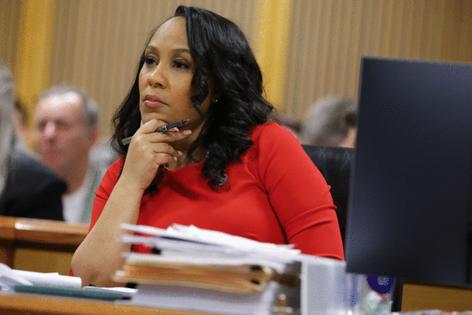Fani Willis loses last chance to stay at the helm of Trump Georgia election interference case
Published in News & Features
ATLANTA — Fulton County District Attorney Fani Willis can no longer oversee the prosecution of President Donald Trump in the 2020 election interference case, according to a decision issued Tuesday by the state’s highest court.
The ruling casts doubt on the future of the last remaining criminal prosecution of Trump. A nonpartisan state agency will now try to find another prosecutor to determine how to proceed with the sweeping racketeering case against Trump and his allies.
In a 4-3 ruling, the Georgia Supreme Court declined to hear the Fulton DA’s appeal of a lower court’s decision in December that said Willis must be disqualified from the case because of her romantic relationship with then-special prosecutor Nathan Wade. The ruling, barring Willis from prosecuting the case, is a crushing blow to the nationally known prosecutor and is certain to tarnish her reputation for years to come.
A spokesman for Willis did not immediately respond to a request for comment.
Jurisdiction over the Trump case is now expected to be handed over to the Prosecuting Attorneys’ Council of Georgia, which steps in when local DAs determine, for ethical reasons, they cannot pursue a case. PAC’s executive director, Pete Skandalakis, has said if his organization gets the case he will try to find a conflict prosecutor.
Skandalakis did not immediately respond to a request for comment on Tuesday.
The indictment, handed up Aug. 14, 2023, alleges Trump and his supporters engaged in a racketeering enterprise in a failed attempt to overturn the 2020 presidential election results in Georgia. The defendants were charged with participating in a racketeering conspiracy and other crimes.
If a new prosecutor is found and decides to move forward, it is widely believed across legal circles that any trial involving Trump will not occur until after his presidential term ends in January 2029. But that would not prevent the new prosecutor from trying other defendants, such as former White House Chief of Staff Mark Meadows, former New York Mayor Rudy Giuliani, former state GOP chair David Shafer and state Sen. Shawn Still.
There is also the possibility a new prosecutor will decide to drop the case against all or some of the remaining 15 defendants. (Four defendants, including lawyers John Chesebro and Sidney Powell, entered guilty pleas.)
The challenge to remove Willis from the case began in January 2024 in a court filing on behalf of defendant Michael Roman, who worked for the Trump 2020 campaign as director of election day operations. After presiding over a contentious evidentiary hearing, Superior Court Judge Scott McAfee ruled that while Willis had a “tremendous lapse in judgment,” the defense failed to prove the DA had an actual conflict of interest. Still, the judge said that Willis could only stay on the election case if Wade stepped aside, which the Marietta attorney did that same day.
In his ruling, McAfee said he was “unmoored from precedent” because he could find few appellate decisions to help him determine when a sitting DA should be disqualified from prosecuting a case.
In issuing its ruling overturning McAfee, the Court of Appeals majority provided scant guidance for judges overseeing disqualification challenges in future cases.
The majority opinion, written by Judge Trent Brown, said that while “an appearance of impropriety generally is not enough to support disqualification, this is the rare case in which disqualification is mandated and no other remedy will suffice to restore public confidence in the integrity of these proceedings.”
Judge Benjamin Land, in a sharply worded dissent, said his colleagues should have given more deference to McAfee because he oversaw the disqualification hearing, assessed the credibility of witnesses and weighed all the evidence. Land added that the majority, “for the first time in the history of our state,” found that an appearance of impropriety was enough to disqualify Willis and her office.
“Where, as here, a prosecutor has no actual conflict of interest and the trial court … rejects the allegations of actual impropriety, we have no authority to reverse the trial court’s denial of a motion to disqualify,” Land wrote. “None.”
But with its decision not to hear the Fulton DA’s appeal, the Georgia Supreme Court is letting the Court of Appeals’ majority opinion stand.
The Georgia prosecution was the last criminal case standing against Trump. The U.S. Department of Justice dismissed the two pending federal cases against him after he was reelected.
Trump was convicted in New York of 34 felony counts of falsifying business records to conceal his affair with porn star Stormy Daniels. But 10 days before he was sworn in again as president, a New York judge sentenced him to an unconditional discharge, sparing him from any penalty such as prison time, home confinement or a fine.
--------------
©2025 The Atlanta Journal-Constitution. Visit at ajc.com. Distributed by Tribune Content Agency, LLC.







Comments